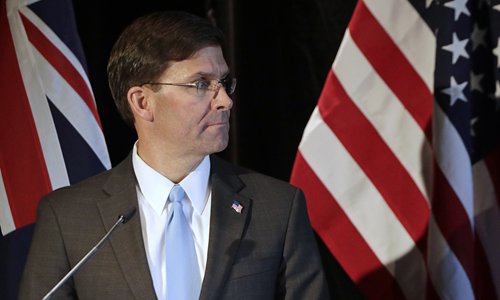HOME >> OPINION
US should look in the mirror before accusing China
By Sun Chenghao Source:Global Times Published: 2020/2/16 22:02:33

US Secretary of Defense Mark Esper Photo: IC
US Secretary of Defense Mark Esper on Saturday launched a string of attacks against China at the 2020 Munich Security Conference, claiming that China has posed challenges to the world by "manipulation of the long-standing international, rules-based order."
His accusations are completely groundless. China has always been an advocate of multilateralism as it pursues a community with a shared future for mankind. In contrast, the US is the true challenger to the current world order.
US President Donald Trump's administration has formulated and implemented foreign policies under the guidance of the "America First" doctrine, placing its own interests above those of all others. In addition, Washington has withdrawn from several international organizations and treaties, as it believes those mechanisms no longer benefit the US itself. All of these moves have greatly disrupted the existing international order.
Esper also accused China of "more predatory economic practices" and "a more aggressive military posture" which is "most concerning" for him. Regarding China's economic activities, he accused China of stealing the intellectual property of Western countries. The fact is that many US companies provided China with technologies on their own initiative in exchange for entering the Chinese market. Only recently have they started to make unfounded charges.
In terms of China's military, this is not the first time Esper has accused China of "military expansion." In December 2019, a spokesman for China's Ministry of National Defense responded to his previous remarks, saying, "If someone insists on forcing China into being a competitor, then China will certainly be a formidable one." Washington needs to reflect on its own military behavior. For instance, the Trump administration has established the US Space Force, sparking an arms race in space. Such examples are numerous, giving the US no grounds to find faults with China. The US itself has long sought superiority and has militarized its foreign relations.
Since Trump assumed office, US policy toward China has seen an obvious adjustment. It has turned into one that underlines great power competition. High-ranking US officials would miss no opportunity to smear China at international arenas. At the just ended Munich Security Conference, Esper again called on Europe and other countries to "wake up" to China's threat. It's obvious that Washington has put great efforts into targeting China, hoping its European allies will help it impede China. At NATO's 70th anniversary summit from December 3 to 4, 2019, the US also attempted to unite its allies by hyping China as a major threat.
These nefarious efforts by Esper and other US officials are futile. From my perspective, Europe is indeed waking up, but not to some make-believe China threat. It is becoming aware of the weakness of its own strength, and that it has been overly dependent on the US. Recent remarks by French President Emmanuel Macron and German Chancellor Angela Merkel have implied that Europe should be more independent and enhance its own power base. I believe the continent will stop pinning its hope on the US and start relying more on itself.
The 2020 Munich Security Conference was focused on "westlessness." A major cause of "westlessness" is the divergence within the Western camp. With the rise of populism and unilateralism inside the US, the traditional values of Europe have suffered huge impacts. As some European scholars put forward, the US has posed many more threats to the West than China or Russia.
In response to Esper's arbitrary accusations, Chinese State Councilor and Foreign Minister Wang Yi refuted that Esper and US Secretary of State Mike Pompeo "say the same thing about China wherever they go," and laid bare that their words are only lies. He also appealed to all countries to practice multilateralism and get rid of the old divisions that separate the West and the East.
It is believed that with China's development and its increasingly significant role in the international community, the world will gradually cast off prejudice, manage differences through cooperation, and eventually build a community with a shared future for humanity.
The author is an assistant research fellow with the Institute of American Studies of the China Institutes of Contemporary International Relations. opinion@globaltimes.com.cn
Posted in: VIEWPOINT